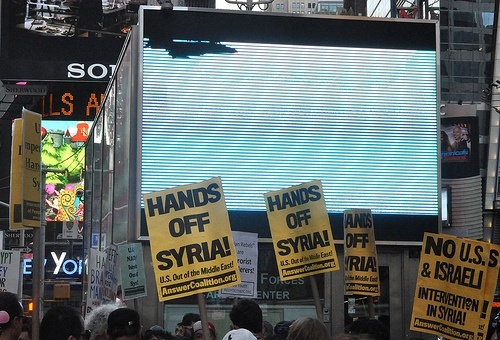Muhammad Idrees Ahmad has taken me to task for pointing out ambiguities in the record of the chemical attacks in Syria and for suggesting that the source of the attacks is uncertain. I did indeed raise doubts whether the statements by John Kerry, Laurent Fabius, and other NATO ministers had given sufficient grounds for the U.S. to enter the civil war in Syria. War should never be launched or joined without the greatest compunction. This war, in particular, which has caused a hundred thousand deaths and precipitated the flight of more than a million refugees, does not promise a happier state of things in its aftermath than existed in Syria before the war began.
Ahmad bases his polemic on a short article I wrote for the Huffington Post, a radio interview, and a diary for the London Review of Books. Because, he asserts, I did not in those places denounce the massacres and other atrocious acts committed by the Assad government, I must have been willfully ignorant or have wished to palliate the crimes. In fact, in order to call attention to the hazards of U.S. intervention, I wrote other articles besides those he mentions: one in the New York Review of Books, one (considerably longer than the column he cites) in the Huffington Post, and still another for the New York Review blog.
In none of these pieces will a single word be found that could be construed as sympathetic to the Assad government. In the last of them, I wrote: “Both sides in the larger war have inflicted death and committed atrocities to the limit of their ability (as UN reports have made clear); the government has killed more people because it has the power to do so.” I will not enter into further details: anyone who wishes to compare my view of the evidence with Ahmad’s description of my view may read the articles listed. I did not pretend to know—and still do not know—who ordered the chemical attacks. I recognized that the evidence supplied by John Kerry failed to justify the retaliatory bombing of Syria, and this was a belief that the British House of Commons and eventually a majority of the American people came to share.
Ahmad has unfortunately employed a method of false inference. The proposition, “It is raining, so there must be clouds,” is true, but it does not render equally true the proposition, “There are clouds, so it must be raining.” The proposition, “A supporter of Bashar al-Assad must oppose Western intervention against him,” is true, but it does not render equally true the proposition, “An opponent of Western intervention must be a supporter of Assad.” There are facts about any public question so well known that they do not require laborious reiteration. Assad has used coercion and violence with a regularity and on a scale that renders democratic legitimacy impossible. He is a despot, as are the leaders of some other countries. He is an internationally non-threatening despot, as were Saddam Hussein and Muammar Gaddafi.
Should the West bomb Syria anyway on humanitarian grounds? The case for doing so would be stronger if recent and similar interventions revealed a state of knowledge and unselfish commitment equal to the task. The case would also be stronger if the forces that the West is most wary of supporting in Syria were not (in significant numbers) the very forces unleashed by disastrous U.S. and NATO actions in Iraq and Libya. The case would be stronger, finally, if the successor government after “regime change” were not exceedingly likely to include a large representation of the al-Nusra Front, the ally of al-Qaeda. Ahmad notices that when I speak of the latter entities, I “invariably paint them in a negative light.” That is a fair characterization. But in what light would he paint them? If he has “positive” thoughts about these organizations—their status as natives of Syria, their commitment to liberty of conscience, freedom of discussion, sexual equality, and so on—he should say so. If he thinks a government constituted by them would be more tractable and humane than the Assad government, it would be interesting to hear his reasons for thinking so. His criticism of my skepticism on this point takes place in a vacuum.
I do not venture the false inference that because Ahmad criticizes those who oppose U.S. and NATO intervention, he must therefore support the bombing of Syria; or that, because, he thinks it wrong to repeat familiar and apparently well-founded claims about the politics and conduct of the Islamists in Syria, he therefore favors the shipping of arms to their commanders. His article does not clarify his own position. Myself, I opposed and still oppose U.S. intervention because I think it would harm the United States and would do no good for the people of Syria. More broadly, I find something repellent in the idea of declaring oneself a violent liberationist in the cause of other people’s liberation. It is a counterfeit solidarity. It costs us nothing except the bombs we drop, and we never know where the violence will end.

